O duyguyu biliriz. Siteniz çöktüğünde ve nedenini bilmediğiniz o batma anı. Bu en yaygın WordPress hatalarından biridir, ancak aynı zamanda en gizemli olanlardan biridir. Size sorunun ne olduğunu söylemez, sadece bir şeylerin bozuk olduğunu söyler.
İyi haber ne mi? Neredeyse her zaman düzeltilebilir. Sayısız müşteriye yardımcı olduğumuz için bu hatayla oldukça fazla karşılaştık.
Bu kılavuzda, sitenizi tekrar çalışır hale getirmek için tam adımlarla size yol göstereceğiz. Sadece takip edin ve her şeyi kısa sürede yeniden çalışır hale getirin.
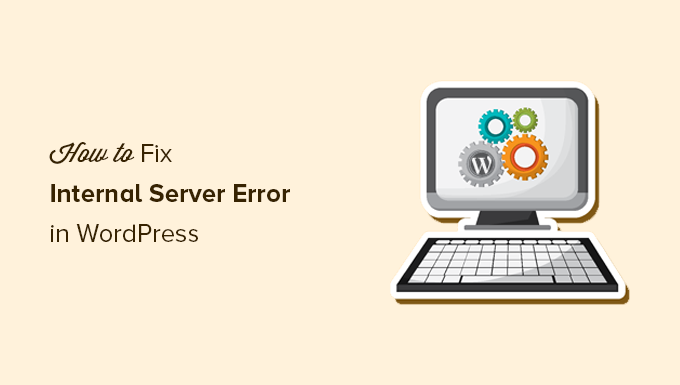
İşte bu makalede ele alacağımız konulara hızlı bir genel bakış:
- What Is the 500 Internal Server Error?
- What Causes the Internal Server Error in WordPress?
- Fixing the 500 Internal Server Error in WordPress
- Clear WordPress and Browser Cache
- Checking for Corrupt .htaccess File
- Increasing the PHP Memory Limit
- Deactivate All WordPress Plugins
- Switch to a Default WordPress Theme
- Re-Uploading Core Files
- Enable Debug Logs in WordPress
- Ask Your Hosting Provider
- Video Tutorial
500 Dahili Sunucu Hatası Nedir?
500 Dahili Sunucu Hatası, anahtarı olmayan kilitli bir kapı gibidir. Bir şeylerin yanlış gittiğini bilirsiniz ama ne olduğunu açıklayan bir not yoktur.
Bu hata sadece bir WordPress sorunu değildir. Sunucu nasıl başa çıkacağını bilmediği bir sorunla karşılaştığında herhangi bir web sitesinde görünebilir.
Mesajdaki “500” bir HTTP durum kodudur. Eğer araştırırsanız, belirsiz bir tanım bulacaksınız:
“500 Internal Server Error yanıt kodu, sunucunun isteği yerine getirmesini engelleyen beklenmedik bir durumla karşılaştığını gösterir.”
Bu pek yardımcı olmuyor, değil mi? Bu, sunucunun “Bir şey bozuldu ama ne olduğundan emin değilim” deme şekli.
Bu hatanın nasıl görüneceği barındırma kurulumunuza ve web tarayıcınıza bağlıdır. İşte bir Apache sunucusunda nasıl göründüğüne dair bir örnek:
Siteniz Nginx üzerinde çalışıyorsa, biraz farklı görünebilir. Ve Google Chrome düzgün bir hata sayfası yükleyemezse, buna benzer bir şey görürsünüz:
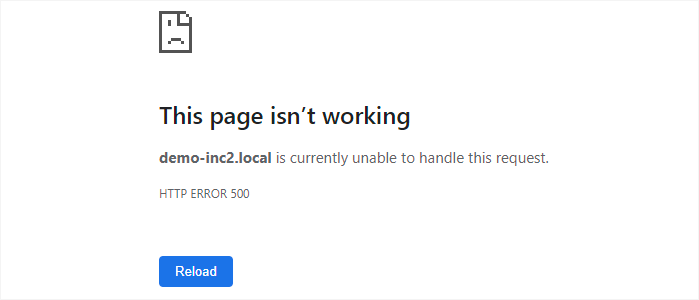
Yeni başlayanlar için bu durum bunaltıcı olabilir. Neyin yanlış gittiğini veya nasıl düzeltileceğini söyleyen bir mesaj yoktur.
Bu, bir tamirciden neyin bozuk olduğunu söylemeden arabanızı tamir etmesini istemeye benzer. Sorunu bulana kadar farklı parçaları kontrol etmeleri gerekecektir.
Deneyimlerimize göre, sorunu çözmenin en iyi yolu adım adım ilerlemektir. Sitenizi tekrar çalışır hale getirebilmeniz için en yaygın nedenler ve çözümler konusunda size yol göstereceğiz.
İsteğe Bağlı WordPress Desteği ile Her Zaman Uzman Yardımı Alın!
Dahili sunucu hatasıyla uğraşmak sinir bozucu olabilir. İsteğe Bağlı WordPress Desteğimiz, teknik sorunları hızlı ve etkili bir şekilde çözmenize yardımcı olmak için burada.
- İsteğe bağlı uzman desteği için tek seferlik ödeme
- Hızlı geri dönüş süreleri
- 7/24 ulaşılabilir
WordPress’te Dahili Sunucu Hatasına Ne Sebep Olur?
WordPress’teki dahili sunucu hatası, eksik parçaları olan bir yapboz gibidir. Bir şeylerin yanlış gittiğini bilirsiniz, ancak hata mesajı size sorunun tam olarak nerede olduğunu söylemez.
Deneyimlerimize göre, en yaygın suçlu bozuk bir .htaccess dosyasıdır. Bazen de yanlış davranan bir eklenti veya kurulumunuzla uyumlu çalışmayan bir temadır.
Diğer zamanlarda, siteniz PHP bellek sınırına ulaşarak WordPress’in çökmesine neden olabilir. Bozuk çekirdek dosyaları da bu hatayı tetikleyebilir ve sizi uyarı vermeden kilitli bırakabilir.
Bazı durumlarda, hata yalnızca WordPress yönetici alanına erişmeye çalışırken ortaya çıkar, sitenizin geri kalanı ise sorunsuz çalışır. Bu, misafirler hala arka kapıdan girebilirken kendi evinizin dışında kilitli kalmak gibidir.
Bu hatayı zor yapan şey, genellikle WordPress düzgün bir şekilde yüklenmeden önce meydana gelmesidir. Bu, sunucunun neyin yanlış gittiğini açıklamak için yeterli ayrıntı toplayamayacağı anlamına gelir.
WordPress’in perde arkasında nasıl çalıştığına daha derinlemesine bakmak istiyorsanız, WordPress’ in kaputun altında nasıl çalıştığına dair kılavuzumuza göz atın.
Şimdi, sitenizi tekrar çalışır hale getirmek için sorun giderme adımlarını inceleyelim.
WordPress’te 500 Dahili Sunucu Hatasını Düzeltme
Sorun gidermeye başlamadan önce, web sitenizin eksiksiz bir WordPress yedeğinin elinizde olduğundan emin olun.
WordPress yönetici alanına erişiminiz varsa, web sitenizin tam bir yedeğini oluşturmak için bir WordPress yedekleme eklentisi kullanabilirsiniz.
Bunu halletmek için Duplicator kullanmanızı öneririz. Yalnızca web sitenizi hızlı bir şekilde yedeklemenize yardımcı olmakla kalmaz, aynı zamanda yedeklerinizi bulutta depolayabilir ve en önemlisi, web sitenizi yedekten geri yükleyebilirsiniz.
Öte yandan, WordPress yönetici alanına erişiminiz yoksa, phpMyAdmin ve bir FTP istemcisi kullanarak manuel olarak bir WordPress yedeklemesi oluşturabilirsiniz.
Bundan sonra, web sitenizdeki dahili sunucu hatasını gidermek ve düzeltmek için aşağıdaki adımları takip edebilirsiniz.
WordPress ve Tarayıcı Önbelleğini Temizleyin
Tarayıcılar ve WordPress önbellek eklentileriniz bazen yanlışlıkla bir hata sayfasının önbelleğe alınmış bir kopyasını saklayabilir.
Bunu düzeltmenin en kolay yolu, öncelikle tarayıcı önbelleğinizi temizlemektir.
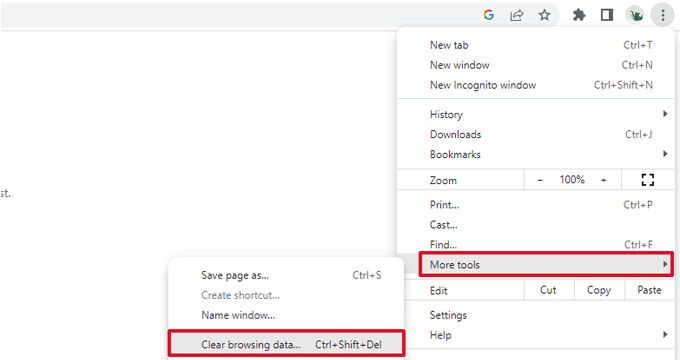
Bundan sonra, web sitenizin WordPress yönetici alanına erişiminiz varsa, önbellek eklentinizin ayarlar sayfasını ziyaret ederek WordPress önbelleğini boşaltabilirsiniz.
Ayrıntılar için WordPress önbelleğinin nasıl temizleneceğine ilişkin eğitimimize bakın.
Bozuk .htaccess Dosyasını Kontrol Etme
.htaccess dosyası, WordPress tarafından yönlendirmeleri ayarlamak için kullanılan bir sunucu yapılandırma dosyasıdır.
Dahili sunucu hatasının en yaygın nedenlerinden biri bozuk .htaccess dosyasıdır.
Bunu düzeltmenin en kolay yolu, WordPress yönetici alanındaki Ayarlar ” Kalıcı Bağlantılar sayfasını ziyaret etmek ve ardından herhangi bir değişiklik yapmadan ‘Değişiklikleri Kaydet’ düğmesine tıklamaktır.
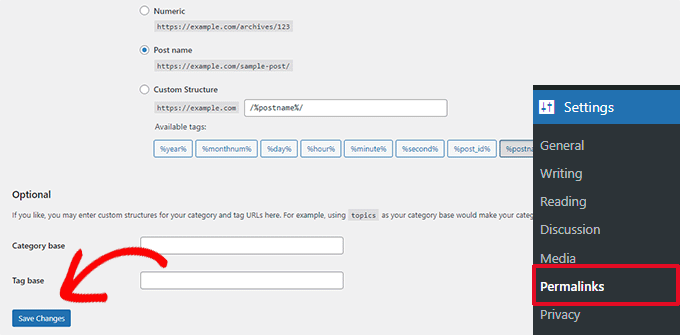
WordPress şimdi .htaccess dosyanızı güncellemeye veya yeni bir tane oluşturmaya çalışacaktır. Bunun dahili sunucu hatasını çözüp çözmediğini görmek için artık web sitenizi ziyaret edebilirsiniz.
Hatayı hala görebiliyorsanız, WordPress’in .htaccess dosyasını oluşturabildiğinden veya dosyaya yazabildiğinden emin olmanız gerekir.
Bazen dosya ve dizin izinleri nedeniyle WordPress .htaccess dosyanızı oluşturamayabilir veya dosyanıza yazamayabilir.
Şimdi .htaccess dosyasını manuel olarak değiştirmeyi deneyebilirsiniz. Öncelikle, hosting hesabı kontrol paneliniz altındaki FTP veya Dosya Yöneticisi uygulamasını kullanarak web sitenize giriş yapmanız gerekir.
Ardından, ana.htaccess dosyanızı.htaccess_old gibi bir adla yeniden adlandırmanız gerekir. Bu, dosyayı yedek olarak tutmanızı sağlar, ancak WordPress onu tanımayacaktır.
.htaccess dosyasını yeniden adlandırmak için, hosting hesabınızın cPanel panosundaki FTP veya Dosya Yöneticisi uygulamasını kullanarak sitenizde oturum açmanız gerekecektir.
Bağlandıktan sonra, .htaccess dosyası wp-content, wp-admin ve wp-includes gibi klasörleri göreceğiniz aynı dizinde yer alacaktır.
Sadece .htaccess dosyasına sağ tıklayın ve .htaccess_old olarak yeniden adlandırın.
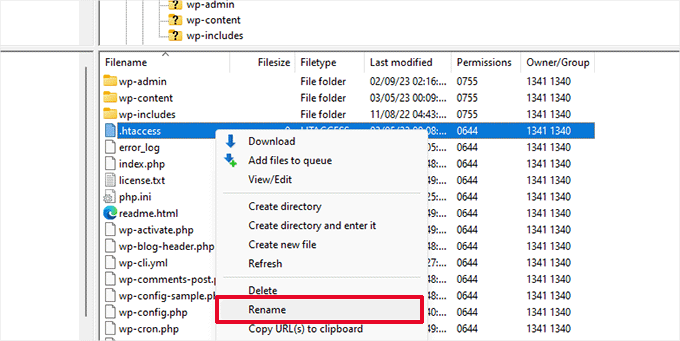
Ardından, yeni bir .htaccess dosyası oluşturmanız gerekir.
Sitenizin kök klasörüne sağ tıklayın ve ardından FTP istemcinizde veya Dosya Yöneticisi uygulamasında ‘Yeni dosya oluştur’ seçeneğini seçin.
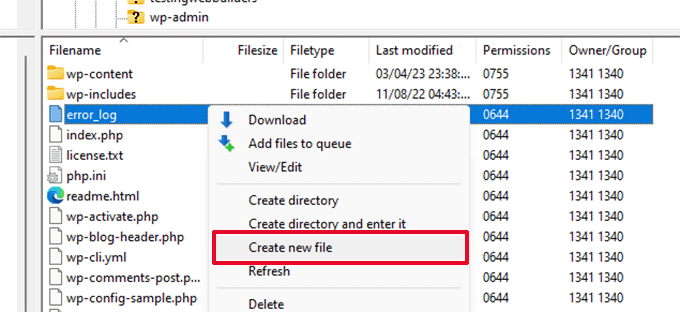
Bu yeni dosyaya .htaccess adını verin ve kaydetmek için ‘Tamam’a tıklayın.
Şimdi, bu .htaccess dosyası şu anda boş ve buna varsayılan WordPress yeniden yazma kurallarını eklemeniz gerekiyor.
Dosyaya sağ tıklayın ve ardından FTP istemcinizde veya Dosya Yöneticisi uygulamanızda ‘Görüntüle/Düzenle’yi seçin.
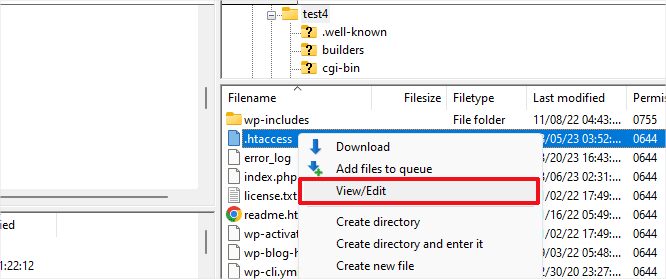
Boş dosya Notepad veya TextEdit gibi bir düz metin düzenleyicide açılacaktır.
Şimdi, aşağıdaki kodu kopyalayıp içine yapıştırmanız gerekir:
1 2 3 4 5 6 7 8 9 10 | # BEGIN WordPress<IfModule mod_rewrite.c>RewriteEngine OnRewriteBase /RewriteRule ^index.php$ - [L]RewriteCond %{REQUEST_FILENAME} !-fRewriteCond %{REQUEST_FILENAME} !-dRewriteRule . /index.php [L]</IfModule># END WordPress |
Bu kod WordPress tarafından kullanılan varsayılan kural setidir. Değişikliklerinizi kaydetmeyi ve dosyayı sunucuya geri yüklemeyi unutmayın.
Bunun dahili sunucu hatasını çözüp çözmediğini görmek için artık web sitenizi ziyaret edebilirsiniz.
Eğer öyleyse, dahili sunucu hatasını düzelttiğiniz için kendinizi tebrik edin.
Önemli: Diğer işlemlere geçmeden önce, WordPress yönetici alanındaki Ayarlar ” Kalıcı Bağlantılar sayfasına gittiğinizden ve herhangi bir değişiklik yapmadan Kaydet düğmesine tıkladığınızdan emin olun. Bu, yazı sayfalarınızın 404 hatası döndürmemesini sağlamak için .htaccess dosyasını sizin için uygun yeniden yazma kuralları ile yeniden oluşturacaktır.
Bozuk .htaccess dosyası çözümünü kontrol etmek sizin için işe yaramadıysa, bu makaleyi okumaya devam etmeniz gerekir.
PHP Bellek Sınırını Yükseltme
Bazen, bir komut dosyası PHP bellek sınırının tamamını tüketirse dahili sunucu hatası oluşabilir.
PHP bellek sınırını artırmanın en kolay yolu wp-config.php dosyasını düzenlemektir. Eğer yeni başlayan biriyseniz bunu yaparken dikkatli olun. WordPress çekirdek dosyalarındaki küçük hatalar bile sitenizi bozabileceğinden bu talimatları dikkatle izlemeniz gerekir.
Başlamak için, bir FTP istemcisi veya hosting hesabı kontrol paneliniz altındaki Dosya Yöneticisi uygulamasını kullanarak WordPress web sitenize bağlanmanız yeterlidir.
Wp-config.php dosyasını web sitenizin ana klasörünün içinde bulacaksınız. Üzerine sağ tıklayın ve ‘İndir’i seçin. Bu, bir şeylerin yanlış gitmesi durumunda bir dosya yedeğinizin olmasını sağlayacaktır.
Bunu kaydettiğinizde, üzerine sağ tıklayıp ‘Görüntüle/Düzenle’yi seçebilirsiniz.
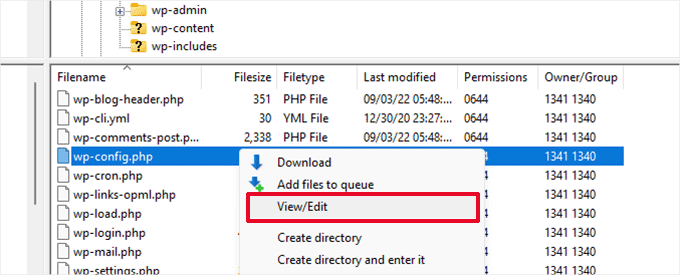
wp-config.php dosyasının içine, ‘Hepsi bu kadar, düzenlemeyi bırakın!’ yazan satırın hemen üstüne aşağıdaki kodu eklemeniz gerekir. Mutlu yayınlar’:
1 | define( 'WP_MEMORY_LIMIT', '256M' ); |
Daha fazla ayrıntı için WordPress’te PHP bellek sınırının nasıl artırılacağına ilişkin eğitimimize bakın.
Not: 256M sorunu çözmezse, 512M’ye çıkarmayı deneyin.
Dahili sunucu hatasını yalnızca WordPress yöneticinize giriş yapmaya çalıştığınızda veya wp-admin’inize bir resim yüklediğinizde görüyorsanız, aşağıdaki adımları izleyerek bellek sınırını artırmalısınız:
- Bilgisayarınızda boş bir metin dosyası oluşturun ve php.ini olarak adlandırın
- Bu kodu buraya yapıştırın: memory=256MB
- Dosyayı kaydedin
- FTP kullanarak /wp-admin/ klasörünüze yükleyin
Bellek sınırını artırmak sorunu sizin için çözdüyse, sorunu yalnızca geçici olarak çözdünüz demektir. Hala bellek limitinizi tüketen nedeni bulmanız gerekir.
Bu, kötü kodlanmış bir eklenti veya hatta bir tema işlevi olabilir. Tam tanılamayı bulmanıza yardımcı olması için WordPress web barındırma şirketinizden sunucu günlüklerine bakmasını istemenizi şiddetle tavsiye ederiz.
PHP bellek sınırını artırmak sorunu sizin için çözmediyse, daha fazla sorun gidermeye ihtiyacınız var demektir.
Tüm WordPress Eklentilerini Devre Dışı Bırakın
Yukarıdaki çözümlerden hiçbiri sizin için işe yaramadıysa, bu hata büyük olasılıkla web sitenizde yüklü olan belirli bir eklentiden kaynaklanmaktadır.
Birbiriyle iyi oynamayan eklentilerin bir kombinasyonu olması da mümkündür.
Web sitenizin WordPress yönetici alanına erişebiliyorsanız, eklentiler sayfasına gidebilir ve tüm WordPress eklentilerini devre dışı bırakabilirsiniz.
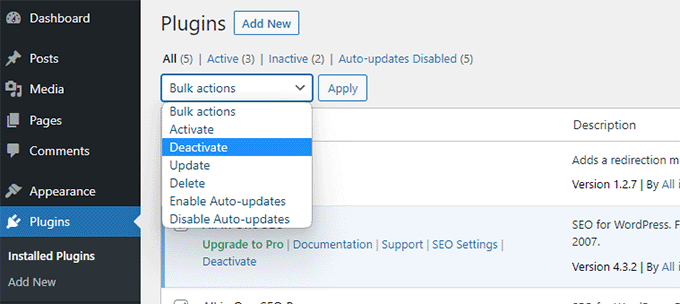
Ancak, WordPress yönetici alanına erişemiyorsanız, FTP kullanarak tüm WordPress eklentilerini devre dışı bırakabilirsiniz.
Bir FTP istemcisi veya barındırma hesabı kontrol panelinizdeki dosya yöneticisi uygulamasını kullanarak WordPress web sitenize bağlanmanız yeterlidir.
Bağlandıktan sonra /wp-content/ klasörüne gidin ve plugins klasörünü plugins.deactivated olarak yeniden adlandırın.
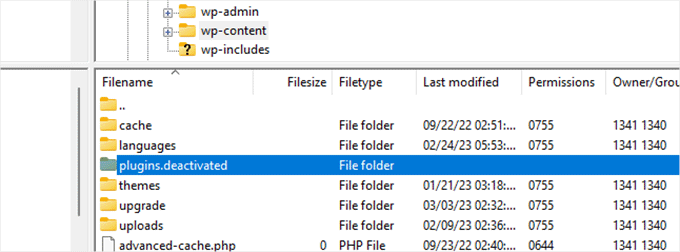
WordPress eklentileri plugins klasöründe arar. Eklentiler klasörü bulunamazsa, tüm eklentileri otomatik olarak devre dışı bırakacaktır.
Şimdi web sitenizdeki dahili sunucu hatasının çözülüp çözülmediğini görmek için web sitenizi ziyaret etmeyi deneyebilirsiniz.
Tüm eklentilerinizi geri yüklemek için ‘plugins.deactivated’ klasörünü tekrar plugins olarak yeniden adlandırabilirsiniz.
Eklentileriniz şimdi geri yüklenecek, ancak yine de devre dışı bırakılacaklar.
Artık eklentileri tek tek etkinleştirebilir ve hangi eklentinin dahili sunucu hatasına neden olduğunu bulmak için web sitenizi ziyaret edebilirsiniz.
Daha fazla ayrıntı için, wp-admin olmadan tüm WordPress eklentilerinin nasıl devre dışı bırakılacağına ilişkin kılavuzumuza bakın.
Tüm eklentileri devre dışı bırakmak web sitenizdeki dahili sunucu hatasını düzeltmediyse, okumaya devam edin.
Varsayılan WordPress Temasına Geçin
Dahili sunucu hatasının olası bir nedeni WordPress temanızdaki bazı kodlar olabilir.
Durumun böyle olup olmadığını belirlemek için temanızı varsayılan bir WordPress temasına değiştirmeniz gerekir.
WordPress yönetici alanına erişiminiz varsa, Görünüm ” Temalar sayfasına gidin. Varsayılan bir tema zaten yüklüyse, temayı değiştirmek için Etkinleştir düğmesine tıklayabilirsiniz.
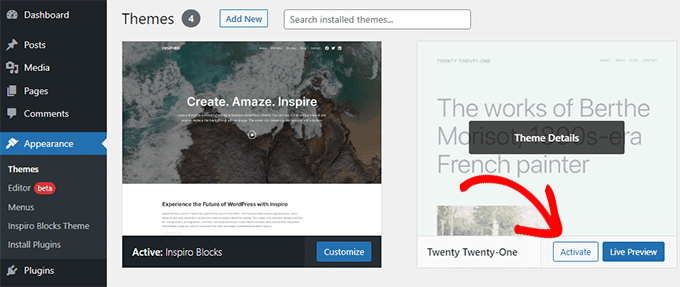
Yüklü bir varsayılan temanız yoksa, üstteki ‘Yeni Ekle’ düğmesine tıklayabilir ve varsayılan bir tema yükleyebilirsiniz (Twenty Twenty-Three, Twenty Twenty-Two vb.).
WordPress yönetici alanına erişiminiz yoksa, yine de varsayılan bir temaya geçebilirsiniz.
Bir FTP istemcisi kullanarak WordPress web sitenize bağlanın ve /wp-content/ klasörüne gidin.
Temalar klasörünü seçmek için sağ tıklayın ve yedek olarak bilgisayarınıza indirin.
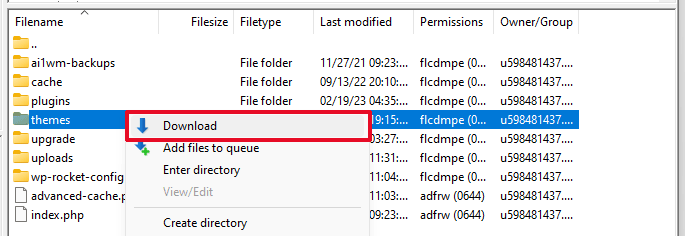
Ardından, temalar klasörünü web sitenizden silmeniz gerekir. Silindikten sonra, devam edin ve yeni bir themes klasörü oluşturun.
Yeni temalar klasörünüz tamamen boş olacaktır, bu da şu anda yüklü herhangi bir WordPress temanız olmadığı anlamına gelir.
Ardından, WordPress temalar dizinini ziyaret etmeniz ve bilgisayarınıza varsayılan bir WordPress teması indirmeniz gerekir.
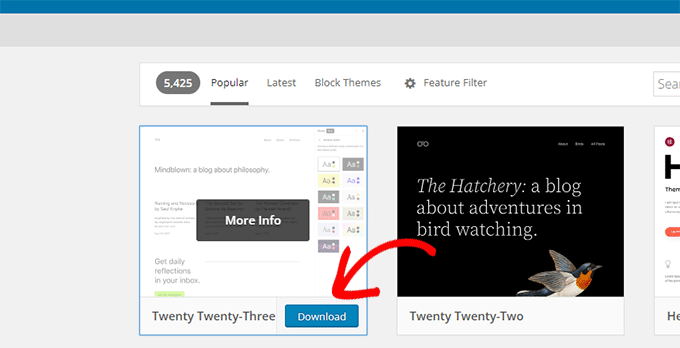
Tarayıcınız daha sonra temayı bir zip dosyası olarak bilgisayarınıza indirecektir.
Dosyayı bilgisayarınızda bulun ve ardından açın. Windows kullanıcıları dosyaya sağ tıklayıp ‘Tümünü Çıkar’ı seçerek dosyayı açabilirler. Mac kullanıcıları zip dosyasına çift tıklayarak çıkartabilirler.
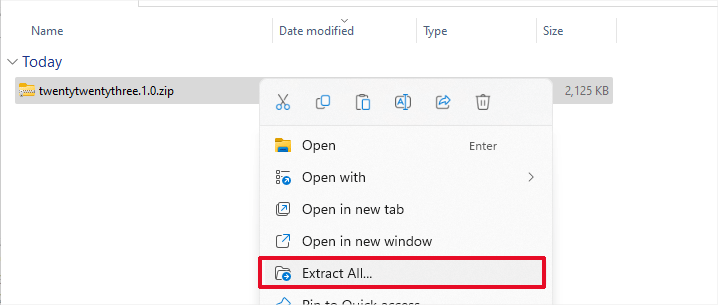
Şimdi WordPress temanızı içeren bir klasör göreceksiniz.
FTP istemcinize veya Dosya Yöneticinize geri dönün ve bu klasörü boş temalar klasörüne yükleyin.
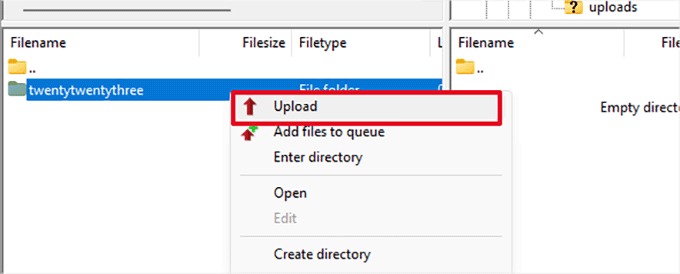
Yüklendikten sonra WordPress otomatik olarak varsayılan temayı kullanmaya başlayacaktır.
Artık dahili sunucu hatasının çözülüp çözülmediğini görmek için web sitenizi ziyaret edebilirsiniz.
Bu işe yaramazsa, WordPress temalarınızı yedekten yeniden yükleyebilir veya kullandığınız temaya geri dönebilirsiniz.
Endişelenmeyin. Hatayı düzeltmek için hala yapabileceğiniz birkaç şey daha var.
Çekirdek Dosyaların Yeniden Yüklenmesi
Eklenti ve tema seçenekleri dahili sunucu hatasını düzeltmediyse, /wp-admin/ ve /wp-includes/ klasörlerini yeni bir WordPress kurulumundan yeniden yüklemeye değer.
Bu, bilgilerinizin hiçbirini KALDIRMAYACAKTIR, ancak herhangi bir dosyanın bozulması durumunda sorunu çözebilir.
İlk olarak, WordPress.org web sitesini ziyaret etmeniz ve ‘İndir’ düğmesine tıklamanız gerekecektir.
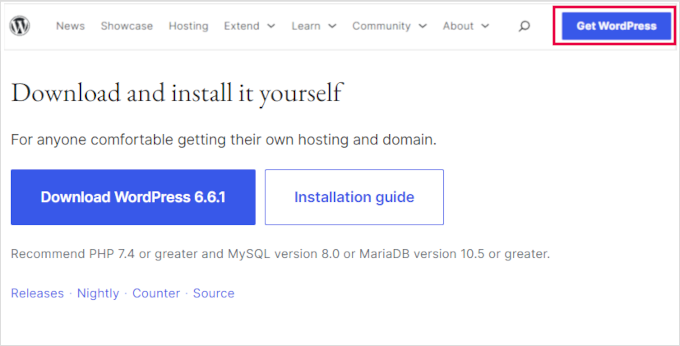
Bu, WordPress zip dosyasını bilgisayarınıza indirecektir.
Devam edin ve zip dosyasını çıkarın. İçinde bir wordpress klasörü bulacaksınız.

Ardından, bir FTP istemcisi kullanarak WordPress web sitenize bağlanmanız gerekir.
Bağlandıktan sonra, web sitenizin kök klasörüne gidin. Bu, içinde wp-admin, wp-includes ve wp-content klasörlerinin bulunduğu klasördür.
Sol sütunda, bilgisayarınızdaki WordPress klasörünü açın.
Şimdi wordpress klasörünün içindeki tüm dosyaları seçmeniz ve web sitenize yüklemeniz gerekir.
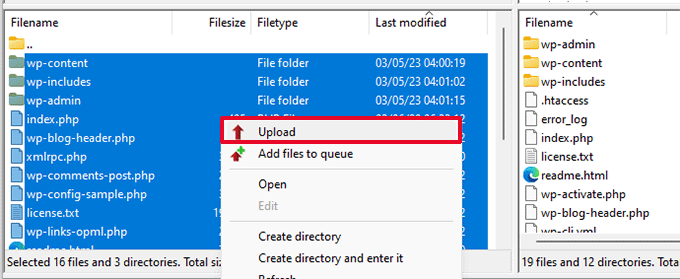
FTP istemciniz şimdi bu klasörleri sunucunuza aktaracaktır.
Size dosyaların üzerine yazmak isteyip istemediğinizi soracaktır. ‘Üzerine yaz’ı seçin, ardından ‘Bu eylemi her zaman kullan’ı seçin ve ‘Yalnızca geçerli kuyruğa uygula’ onay kutusunu işaretleyin.
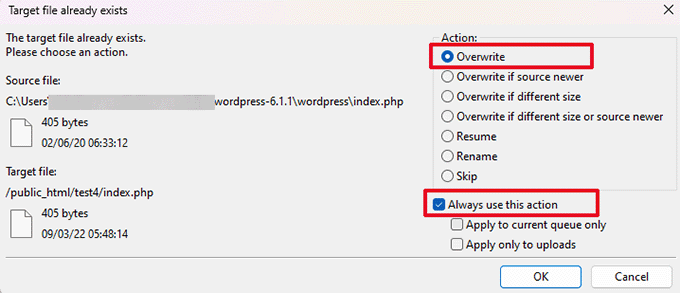
FTP istemciniz artık eski WordPress dosyalarınızı yeni, taze kopyalarla değiştirecektir.
WordPress dosyalarınız bozulmuşsa, bu adım dahili sunucu hatasını sizin için düzeltecektir.
WordPress’te Hata Ayıklama Günlüklerini Etkinleştirme
WordPress, hata ayıklama için günlük tutmak üzere yerleşik bir sistemle birlikte gelir.
WP Hata Ay ıklama eklentisini kullanarak bunu açabilirsiniz. Daha fazla ayrıntı için WordPress eklentisi yükleme kılavuzumuza bakın.
Eklenti etkinleştirildiğinde, WordPress web sitenizde hata ayıklama günlüklerini açacaktır.
WordPress web sitenizin yönetici alanına erişiminiz yoksa, wp-config.php dosyanıza aşağıdaki kodu ekleyerek hata ayıklamayı açabilirsiniz:
1 2 | define( 'WP_DEBUG', true);define( 'WP_DEBUG_LOG', true); |
Hata ayıklama günlüklerini açtıktan sonra, bir FTP istemcisi kullanarak ve /wp-content/ klasörüne giderek bunları görüntüleyebilirsiniz.
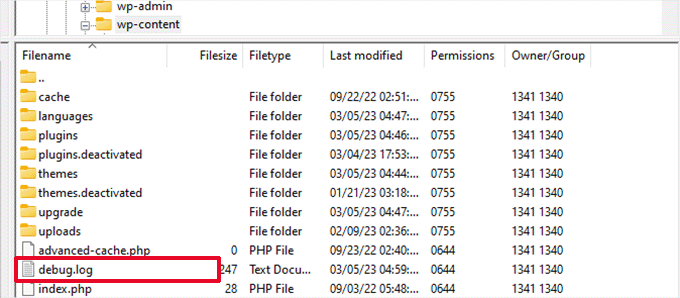
Hata ayıklama günlük dosyasını bir metin düzenleyicide açabilirsiniz ve size web sitenizde meydana gelen hataların ve uyarıların bir listesini gösterecektir.
Bazı hatalar ve uyarılar, düzeltilmesi gerekmeyen zararsız olaylar olabilir. Ancak, web sitenizde bir dahili sunucu hatası görüyorsanız, bunlar sizi doğru yöne yönlendirebilir.
Hosting Sağlayıcınıza Sorun
Tüm yöntemler web sitenizdeki dahili sunucu hatasını düzeltmede başarısız olursa, daha fazla yardım almanın zamanı gelmiş demektir.
Web barındırma destek ekibinizle iletişime geçin; sunucu günlüklerini kontrol edebilir ve hatanın temel nedenini bulabilirler.
Sorun gidermeye kendi başınıza devam etmek istiyorsanız, yeni başlayanlar için nihai WordPress sorun giderme kılavuzumuza bakın.
Video Eğitimi
If you liked this article, then please subscribe to our YouTube Channel for WordPress video tutorials. You can also find us on Twitter and Facebook.





GEO D`ANJOS
It was necessary to update the plugin. Nothing more.
Very good this poster
Yasir
I encountered the following error :
Error 500 – Internal Server Error
An error was encountered while processing your request. Typically this is a temporary condition. Please contact the web site owner for further assistance.
So I talked to my hosting support and they suggest me the following procedure :
” Your cPanel account was set to use the PHP version 5.2, and it needed to be updated to the PHP 5.4 version. ”
Thanks ………. I worked for me ….
I am using inmotionhosting .
Venkateswarlu Santha
thanks so much… its working me
Sue
Thank you! Great advice even a non-techie volunteer can follow. The htaccess file was the main fix, but I could see by the logs that memory was creating a continual problem, so fixed that while I was at it.
Helpful Colin
I have not been in the situation where I have had to test my plugins by disabling them all yet, but if I had to test them all I would try this method to try and reduce the number of tests required after deactivating them all:
1. I would reactivate 50% of them. If the problem recurred I would know the problem plugin was in the reactivated group else it would be in the deactivated group.
2. If the problem was caused by the reactivated group I would deactivate 50% of them and retest else I would reactivate 50% of the other group that had not yet been reactivated and retest.
3. At this point I would know which group of 25% of all my plugins contained the faulty plugin and change the activation state of 50% of that group and retest.
4. At this point I would know which group of 12.5% of all my plugins contained the faulty plugin.
If I had 32 plugins the percentages above would divide them up very neatly into groups of 16, 8, 4, 2 and 1. It’s more likely that I would have to divide them into groups of unequal sizes but that doesn’t detract from the basic concept of reducing the number of tests to only 5 instead of 32.
If the problem proved to be with the only plugin I had not reactivated by this method then I would obviously carry out a sixth test with that plugin alone. If it proves that there is only a problem when it is activated along with other plugins then the scene would get complicated.
Warlley
That helped a lot! Thank you
mgarfath
it was w3 total cache plugin that caused error on my site, I renamed the cache folder but it didn’t changed any thing, then there were some other files that were written like w3 advanced cache.php something like that, I renamed EVERY FILE that had w3 cache or Even cache written on it worked but i accidentally deleted my .htaccess file, i had copied the content of the file safely, so i created new .htaccess file and uploaded it on the server, everything got fixed.
I hope this solution helps some one else who has this problem.
Than ks
Andrea S
thanks so much! I did, I was in panic, fortunately the first option (.htaccess) did the trick
anton
hello
i changed my theme to a tube video them named ” detube”
but after changing i am receiving a huge number of internal error 500 in Google webmaster( more then 800 error daily) and sometimes when i browsing my website don’t load and show me ” bandwidth limit resource” and also i receiving about 15 warning regarding to sitemap in Google webmaster
before changing theme i didn’t have any issues
can anyone help me? what can i do? i am losing my Google visitors
sarfraz khan
Thousand likes . .htaccess was problem and i just did it as shown in the video and the problem is solved
Gulshan Kumar
Internal Server Error mostly happens in Free Hosting. When I upgraded to premium, everything was on track.
Rich Finelli
This article has helped me at least twice in the last year! Thanks!
Joel Rodriguez
Deactivating Plugins solved my problem… Thanx a ton
Alberto Cardenas
Thanks mate, you saved my life hehehe, and gain a new follower, great site.
Serge
php.ini with memory=64Mb had solved my problem BIG THANKS!!!!
David
Very good
jakies
nop nothing of this soloutions solve the problem
toniak
many many thanks for this article
Nez
Thank you for these tips! It helped me a lot!
Imran Bughio
Bravo!
“Checking for Corrupt .htaccess File” This section helped me solve the issue, Thanks for the post
Sandile
Hi. Thank you for sharing this, I have recently experienced a 500 internal server error on my website but I re-uploaded wp-admin and wp-includes from fresh install, now everything is working in a good condition. Thank you.
Karan
The problem with my site is that sometimes it loads correctly and sometimes it shows 500 internal server error. Can you please tell me the reason for this?
Andrew P.
So, I have a really weird internal 500 error happening. My homepage loads up fine but whenever I click a link in the nav bar to go to another page the internal error pops up. I ran through this list of fixes and can’t seem to figure it out. Also my hosting provider doesn’t have a clue any ideas?
Sheff
Thank you for this. My dashboard crashed midway through a Wordfence Security update. I tried for over 3 hours to fix it but could not get into my dashboard. (500 http error in IE, white screen in firefox)
I was about to get my host to do a restore from last night and lose a day’s work until I found this page. I used FileZilla renamed the plugins folder on the serer to “plugins-frs” and was able to get into my dashboard with all 14 plugins deactivated. I then renamed the folder back to “plugins” and was able to activate them one at a time. They retained all of their settings, no problem.
I manually downloaded and uploaded the latest version of the Wordfence Security plugin that started my problems and activated the new version without issue.
I need to move to Newfoundland and become a cod fisherman before I go insane!
Sheff
Maher Aarag
What is a FTP?
And how to log in to my site using the FTP?
Do you mean log in to my Godaddy domain? or worldpress?
Prashant
FTP = File transfer protocol.
to login with ftp (in Godaddy Cpanel) you should go to your control panel and then go to FTP options and create new ftp by selecting ‘public_html’ directory and then login with any ftp clients like Filezilla.
host: ftp. yourdomain. com
username and password: as your specified while creating FTP user.
port: leave blank or 21.
Akpan Promise
FTP means file transfer protocol. It helps you transfer and edit files on your server.
FTP software for instance are Filezilla, CuteFTP.
Lisa Martin
Thanks you. I’ve used this technique multiple times on the same site. How can an .htcaccess file get corrupted? Is there anything that can be done to prevent it?
WPBeginner Support
You should check your .htaccess file permissions using an FTP client. These file permissions should be set to 644.
Admin
Lisa Martin
Thanks – I just thought to check here for your reply. The permission on the file is set to 644, but it keeps happening. It always works to rename the site and reload it, but often the client has to tell me his site is down before I know to go fix it for him. It looks like this is an issue in many WordPres forum threads as well.
Stephen Lee
Some plugins access the .htaccess and if there is a disruption to their function while doing so can introduce errors into the .htaccess coding.
Lisa Martin
Thank you. My solution for this recurring problem was to find all instances of “flush_rewrite_rules” and pass in “false,” so that the .htaccess file is not rewritten in the plugin code. https://codex.wordpress.org/Function_Reference/flush_rewrite_rules
I could not disable the plugin, since it is WooCommerce and that’s the whole basis for the site. This seems to be a pretty good fix for the situation I’m in.
Jon
Thank you for the tips, as I successfully recovered my site using these suggestions. A corrupt hta access file was the issue. Using FileZilla (highly recommended FTP Client) I was able to disable my plugin folder, then disable the hta access file.
Richard
What do I do when I can’t even enter the WP Admin without getting this error??
I can sign in fine and see those options, but the moment I want to enter the Admin panel, it gives me this error. I can’t even look up themes, customizer, etc because it involves the WP Admin menu.
What Do I Do?
Please Help
PS: I’ve never had issues with my site, but the WP Admin.
Hiago Ams
Great! Thanks so much, the best step by step available for most things I want is here
Danielle Olson
Thank you! This was so helpful. When I added _deactivate to my plugins folder, I got a different error message that had to do with one plugin in particular. So, I went in and added _deactivate to individual plugins until I found the one that was the problem.
msmith00
Just had an issue with this and thought I’d pass along my findings… looking in the root folder, a second .htaccess file had appeared overnight and created the 500 Internal error.
I simply removed the new .htaccess file (where it came from I don’t know), and all is back to normal.
Elliot K
This is the best WordPress help site around hands down! Love it so much! Guides are simple and everything always works for me first try. Thanks wpbeginner
Adil Adeel
This is a very informative and simple to understand tutorial for WP Beginners like me. I am using WordPress for last 5 years but as a blogger. Recently I had to install and look after couple of WordPress sites. Now 10 days back first WordPress site went down with 500 internal server error. I searched for the solution and landed on this page and did first step i-e renamed .htaccess file and problem was solved. Now again today the second site went down OMG !!!!! But again I visited this page to check for the solution.Now I have done all the steps explained on this page and nothing worked for me
OMG !!!!! But again I visited this page to check for the solution.Now I have done all the steps explained on this page and nothing worked for me  I have contacted the hosting provider and they are looking into problem for me. I will come back to share the solution once they rectify the problem. Thank you
I have contacted the hosting provider and they are looking into problem for me. I will come back to share the solution once they rectify the problem. Thank you
jofralogo
After trying everything (.htaccess, fresh install of wp-include/wp-admin, deactivate plugins…) I finally solve this problem doing this:
1) Create a new folder in your wp directory.
2) Move all files to this new directory.
3) Move them back to the original folder.
4) Ta-da!
I know it sounds stupid but it worked for me.
Shahin Shateri
This helped me a lot. fixed the issue.
JCP
Thanks for saving my ass guys, just got a new job and got thrown into fixing the website (despite not part of my job description) and wow, those pesky plugins! As deemyboy says: BACKUP that wp-content folder!!!!!!!
ed
maybe be a plugin
thankfulpj
Thank you so much for this guide! At least I was able to start somewhere while I wait for my hosting to check it. In my case, it was not any of the ones listed but a large error log on the home directory (it was 2GB) that did it. But when I re-uploaded the core files, I decided to delete it and it worked.
Paulo André Matta
Hi, I have tried all those sollutions above, but none worked for me. Im getting kind of desperated. Im new to WP.. I was changing some Settings (in the wp-admin link) and when I hit save, the 500 error came up. Idk what to do
Shaswat Shah
I uploaded the php.ini file to my /wp-admin/ folder. But now I am confused how can i know if 500 interneral server error is fixed or not ? because the error was coming simultaneously not all the time. Please help.
Patricia Mirasol
I know I got the internal service error because I was tinkering with my .htaccess file right before it occurred. Tried to log in using FTP clients (FileZilla and WinSCP) but I kept getting a connection error timeout. Just emailed my hosting provider. Hopefully, my provider will be able to help me with this.
Andrea Spila
Hi Silvia and thanks for this! I changed the permissions of the two files in wp-admin that were causing problems to 775 (from 664) and this solved then issue. And I don’t know why this happened too! It happened out of the blue. Mystery!
rajesh adulapuram
I tried all the above steps and finally when contacted My host provider iPage it was rectified. They told the problem is with file permissons and they rectified. This should have been my First step
Matt
I got back into my WP-Admin by renaming .htaccess but when I did settings>permalink>save as you recommend, I got locked out of admin again. Now renaming .htaccess does nothing. Any ideas?
Furkanicus
I’ve had this problem so many times and I feel comfortable sharing my advise on this as an 500 Error expert. Sometimes the problem was solved by changing the htaccess file, but it was a temporary solution. As it’s pointed out in the article, 500 service errror is mostly caused by PHP memory limit and unfortunately adding a php.ini file is not going to cut it. Most hosting companies set Php limit to 128MB, including Dreampress, and if you exceed that limit, your hosting provider will momentarily cut the connection to your website. My advise for you people who has this problem is this. Install P3 Plugin and designate the memory-hogging plugins. If they’re not essential, remove them. Also, changing your host provider to a boutique one instead of Bluehost or Hostgator will get your better customer service and higher product quality.
WPBeginner Staff
If you cannot find your .htaccess file, then you can always create a new blank file in a text editor. Name this file .htaccess and upload it to your website’s root directory using an FTP client.
Tobie! ®
i still have a problem with this. i cant find my .htaccess file, and i have been locked out of admin. the whole site can’t be viewed. please help me
Gaurav
.htaccess is hidden. When accessing your file make sure you can hidden file also
Michael Fuller
Use cPanel > File Manager to access files
Tobie! ®
i’ve tried all these, and it still doesnt work!! i cant find my .htaccess file and i cannot generate it because i’m locked out of admin, HELP PLEASE!!!
Chirag Patel
Change index.php permission to 644
Thomas
That did it for me after everything else didn’t work!
David Moore
Thank you, thank you. The index.php to 644 did the trick for me after all sorts of hassle.
Hasan Zaheer
Very helpful, but one more thing, mostly its due to w3 total cache plugin, if you have that you can rename cache plugin folder through FTP and then try, my site was fixed this way
jim
thx … clear w3 cache solve my problem